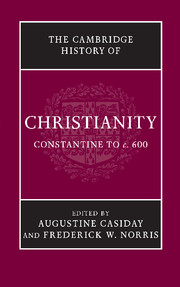Book contents
- Frontmatter
- Introduction
- Part I Christianity: Regional Developments
- Part II Christianity Contested
- Part III Christian Culture and Society
- Part IV Christian Beliefs and Practices
- 18 Discourse on the Trinity
- 19 History of Christology to the seventh century
- 20 Sin and salvation: Experiences and reflections
- 21 From Antioch to Arles: Lay devotion in context
- 22 Saints and holy men
- 23 Pastoral care and discipline
- 24 Sexuality, marriage and the family
- 25 The growth of liturgy and the church year
- 26 Interpreting scripture
- 27 Asceticism and monasticism, I: Eastern
- 28 Asceticism and monasticism, II: Western
- 29 Art and Propaganda fide: Christian art and architecture, 300–600
- Index
- Map 1 The Roman empire, c. 400">
- References
19 - History of Christology to the seventh century
from Part IV - Christian Beliefs and Practices
Published online by Cambridge University Press: 28 March 2008
- Frontmatter
- Introduction
- Part I Christianity: Regional Developments
- Part II Christianity Contested
- Part III Christian Culture and Society
- Part IV Christian Beliefs and Practices
- 18 Discourse on the Trinity
- 19 History of Christology to the seventh century
- 20 Sin and salvation: Experiences and reflections
- 21 From Antioch to Arles: Lay devotion in context
- 22 Saints and holy men
- 23 Pastoral care and discipline
- 24 Sexuality, marriage and the family
- 25 The growth of liturgy and the church year
- 26 Interpreting scripture
- 27 Asceticism and monasticism, I: Eastern
- 28 Asceticism and monasticism, II: Western
- 29 Art and Propaganda fide: Christian art and architecture, 300–600
- Index
- Map 1 The Roman empire, c. 400">
- References
Summary
The earliest biblical confessions of Jesus were varied, yet linked. He was the Messiah, the fulfilment of Israel’s hopes and the eschatological accomplishment of God’s reign, even as he was also a prophet promised by Moses and a teacher in the wisdom tradition. His death demonstrated God’s salvation; his resurrection proclaimed him alive. Therefore, as the Christian community moved from the Old Testament, the word of God, to the Christian Bible, these different Christologies were connected. Nevertheless, in constantly changing contexts, diverse Christological confessions emerged within a broader understanding of the apostolic kerygma.
The faith of Christians quickly came to be determined by their hope of being redeemed by God himself. From the Old Testament prophets, the community learned that the one God of salvation (Isaiah 43.11, 45.21, 63.9) brought this salvation in Jesus Christ. This Jesus was the presence of God on earth (see Epistle of Barnabas 3.35–37). ‘Brothers, we must think about Jesus Christ, as we do about God, the judge of the living and the dead. We ought not to think lowly things about our salvation,’ says 2 Clement, the oldest extant Greek homily. These words correspond with Barnabas: God is the saviour (Isaiah 49.7); he is the Lord (Kyrios) whose suffering for our sake made Christians the true heirs of Moses’ Testament.
Such juxtaposed but reconciled claims – Old Testament monotheism and belief in Jesus Christ as the redeemer – led to the first Christian theology. Although modern scholarship has sometimes depicted it as heretical modalistic monarchianism, in fact it reproduced the Great Church’s doctrine. When Hippolytus of Rome (d. 235) and Tertullian (d. after 220) contested it, it was the majority formula of faith: Jesus Christ is God.
Keywords
- Type
- Chapter
- Information
- The Cambridge History of Christianity , pp. 460 - 500Publisher: Cambridge University PressPrint publication year: 2007



